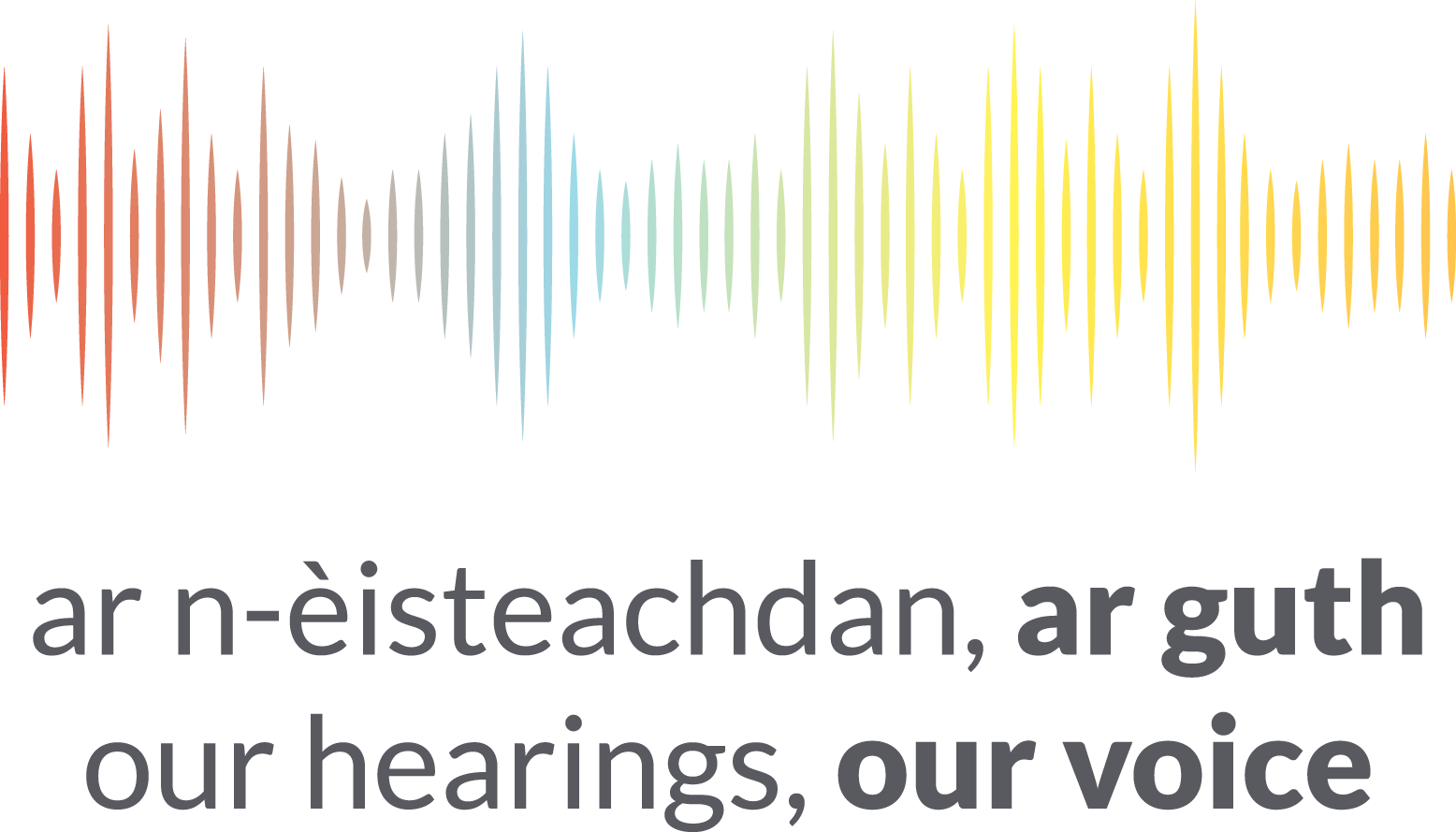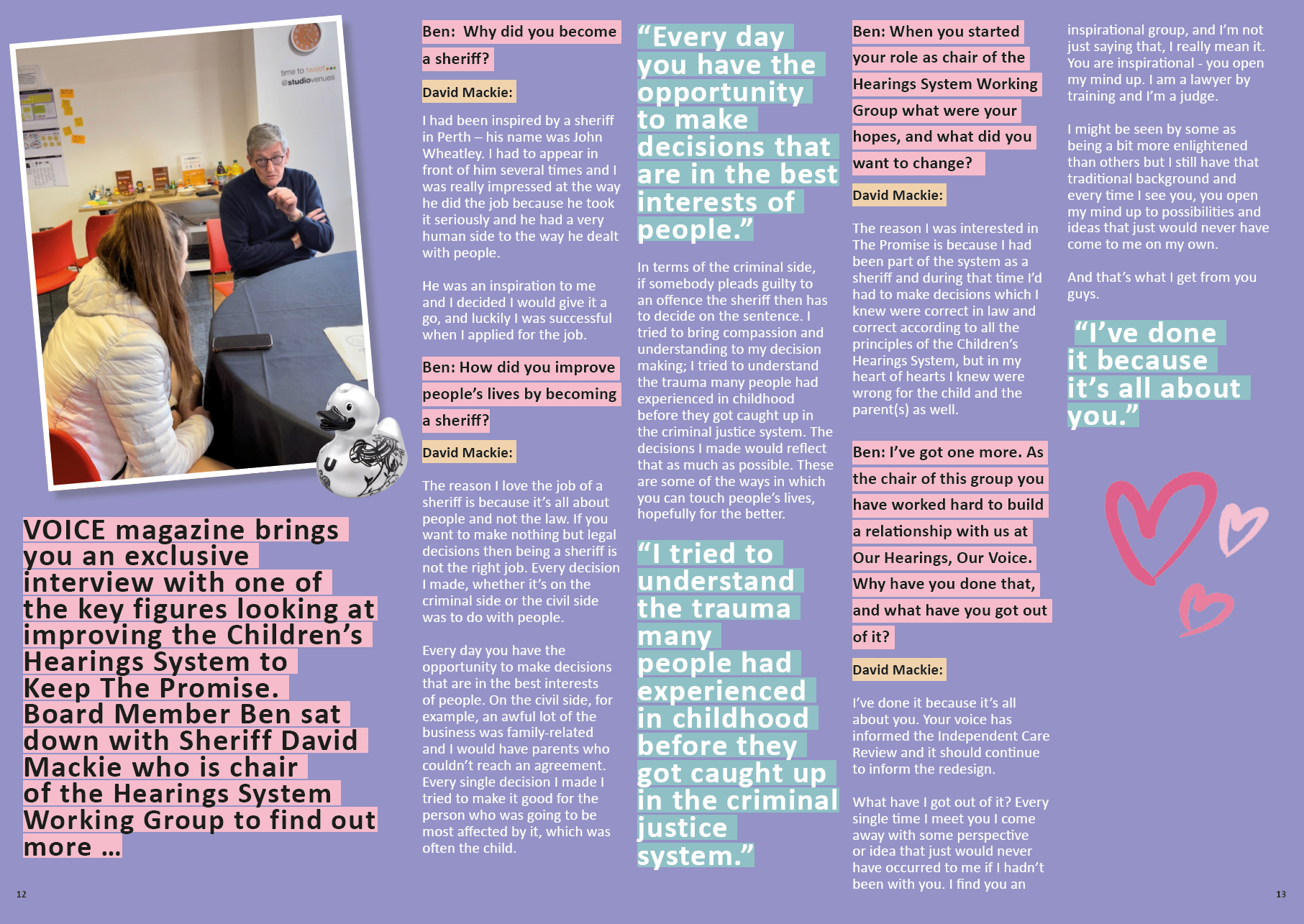Talking system reform ...
Our second edition of VOICE magazine had an exclusive interview with one of the key figures looking at improving the Children’s Hearings System to Keep The Promise. Board Member Ben sat down with Sheriff David Mackie who is chair of the Hearings System Working Group to find out more.
In case you missed it, you can read the full interview below. ![]()
Ben: Why did you become a sheriff?
David Mackie: I looked into becoming a sheriff because I had been inspired by a sheriff in Perth – his name was John Wheatley, he later became Lord Wheatley. I had to appear in front of him several times and I was really impressed at the way he did the job because he took it seriously and he had a very human side to the way he dealt with people. He was an inspiration to me and I decided I would give it a go, and luckily I was successful when I applied for the job.
Ben: How did you improve people’s lives by becoming a sheriff?
David Mackie: The reason I love the job of a sheriff is because it’s all about people and not the law. If you want to make nothing but legal decisions then being a sheriff is not the right job. Every decision I made, whether it’s on the criminal side or the civil side was to do with people. Every day you have the opportunity to make decisions that are in the best interests of people. On the civil side, for example, an awful lot of the business was family- related and I would have parents who couldn’t reach an agreement; they’d maybe separated and couldn’t agree where the children should live and who should have contact and how often and that sort of thing. Similar to the sort of issues that can arise in a Children’s Hearing. My job became one of mediating between the parents, but I would always say to them, ‘if you can’t agree I’ll make the decision for you.’ Every single decision I made I tried to make it good for the person who was going to be most affected by it, which was often the child.
The criminal side, it happened especially when it came time to sentence people. If somebody pleads guilty to an offence the sheriff then has to decide on the sentence. I tried to bring compassion and understanding to my decision making; I tried to understand the trauma many people had experienced in childhood before they got caught up in the criminal justice system. The decisions I made would reflect that as much as possible. These are some of the ways in which you can touch people’s lives, hopefully for the better.
Ben: When you started your role as chair of the Hearings System Working Group what were your hopes, and what did you want to change?
David Mackie: My views then were quite different to what they are now. It so happens that The Promise was delivered just when I retired, in 2019, and I said to Fiona Duncan (who’s the chair) that I would be quite interested in helping deliver The Promise and that they could treat me as a volunteer. The reason I was interested is because I had been part of the system as a sheriff and during my time as a sheriff I’d had to make decisions which I knew were correct in law and correct according to all the principles of the Children’s Hearings System, but in my heart of hearts I knew were wrong for the child and the parent(s) as well. I’d had too many cases where I’d had to make decisions on emergency orders to separate new born babies from their mothers, most often because the mother had a drug problem.
There were too many cases where I had to make a decision that grounds for referral did exist and that the case should go to a Children’s Hearing, when I knew in fact that a Children’s Hearing probably wasn’t the best course for that child. And I also dealt with appeals. I remember in 2014 I wrote a judgment which was ten pages long and full of law – a very complicated appeal – but in the end I said in a kind of ‘by the way’ note, that in this case, over a period of eighteen months, that there had been something like twenty-plus hearings. Every two or three weeks there’d been a hearing. There had been fifty different panel members, twenty-two different chairs, and only two panel members had been to more than one hearing in what was a very complex case. I remember counting up the pages and there was over five-hundred pages in the bundle. There was a social work report, a psychiatric assessment, a parenting assessment, a long chronology. I thought that there was no way, week to week, that new panel members could read those papers on Tuesday for a hearing on Friday and do it justice. That was the point at which I said, ‘this system needs to change.’ I hoped when I started working with the Hearings System Working Group that I would help achieve that change. I have to say, however, that the level of change I’m thinking about now goes way beyond anything I was thinking about at that stage.
Ben: I’ve got one more. As the chair of this group you have worked hard to build a relationship with us at Our Hearings, Our Voice. Why have you done that, and what have you got out of it?
David Mackie: I’ve done it because it’s all about you. Your voice has informed the Independent Care Review and it should continue to inform the redesign. What have I got out of it? Every single time I meet you I come away with some perspective or idea that just would never have occurred to me if I hadn’t been with you; it’s happened today again. I find you an inspirational group, and I’m not just saying that, I really mean it. You are inspirational – you open my mind up. I am a lawyer by training and I’m a judge and I’ve worked in that world and might be seen by some as being a bit more enlightened than others but I still have that traditional background and every time I see you, you open my mind up to possibilities and ideas that just would never have come to me on my own. And that’s what I get from you guys.
Our Hearings, Our Voice
An independent children and young people’s board for the Children’s Hearings System
© 2024 OHOV
Follow us

